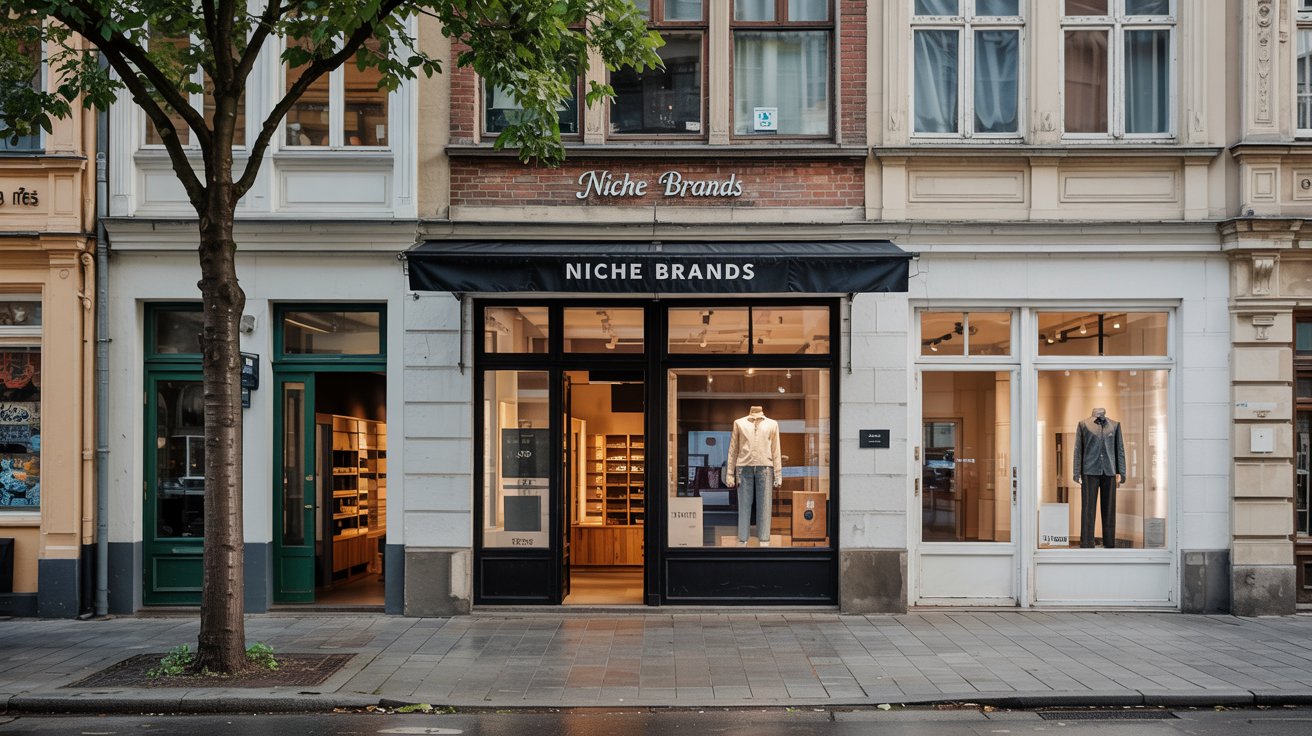Niche e‑commerce platforms: Best of specialized markets in DACH
Written by
Kinga EdwardsPublished on
Explore top niche e-commerce platforms in the DACH region. Find specialized markets that offer unique products or get inspired for your own business!

Not every successful online store needs to compete with Amazon or Zalando. In fact, some of the most exciting e-commerce success stories are happening far from the spotlight — quietly building loyal communities around very specific things.
We’re talking about niche platforms. Small but mighty.
And in our view, nowhere is this shift more visible than in DACH — the German-speaking region made up of Germany, Austria, and Switzerland. Here, shoppers are looking for purpose, not just products. They’re turning to online stores that share their values, understand their lifestyles, and deliver something deeper than convenience.
From eco-friendly water bottles to handcrafted alpine cosmetics, this is where niche ideas thrive — and where digital innovation meets tradition, quality, and care.
So, what makes these platforms so powerful?
And which ones are leading the charge?
Let’s take a closer look.
What defines niche e-commerce today?
Niche e-commerce platforms distinguish themselves by offering specialized products and experiences tailored to specific consumer segments. Unlike broad marketplaces, these platforms focus on curated selections that resonate deeply with their target audiences.
In the DACH region, this approach aligns with consumers who prioritize sustainability, quality, and authenticity.
Moreover, the region’s consumers are increasingly turning to specialized online stores that align with their values and interests. It’s evident in the rise of platforms that focus on sustainable products, local business craftsmanship, and curated selections catering to specific lifestyles and preferences.
Why niche e-commerce is thriving in DACH
The DACH market (Germany, Austria, and Switzerland) has emerged as a fertile ground for niche e-commerce platforms. For 2024, the combined e-commerce revenue of these countries was projected to reach approximately €131.9 billion, with expectations to grow to €174.4 billion by 2028.
What factors contribute to this growth?
Well, every country has its own strengths:
- Germany: Germany’s e-commerce market alone is expected to generate almost $136.83 billion by 2029. With one of the highest purchasing power levels in Europe (ranking 3rd among German-speaking countries), it provides a strong base for e-commerce spending. Germans also lean toward mobile shopping and prefer secure online payments like PayPal — making it easier for smaller platforms to build trust and reach mobile-first users.
- Austria: Austrian households enjoy an average annual income of €35,000, placing the country 8th in the OECD rankings. Online shopping via mobile is rising, especially in urban hubs like Vienna. Austria’s EU membership streamlines cross-border trade, helping local niche sellers grow beyond national borders.
- Switzerland: Boasting a purchasing power of nearly €50,000 per person, Switzerland ranks among the top globally. Though it’s outside the EU, its trade agreements still support e-commerce imports. Swiss consumers are digitally savvy, using both mobile and desktop for shopping — and they’re loyal to secure, high-performance payment systems.
These factors together make the DACH region a supportive environment for niche e-commerce brands to flourish.
Top niche e-commerce platforms in DACH
Let‘s now move on to our list of niche e-commerce platforms in DACH. These brands are more or less recognizable, but they have a lot in common, such as the exceptional work they do.
Of course, this list is not definitive, as we can find even more successful brands operating in niche e-commerce markets in the DACH region. Yet, the ones listed below are definitely worth a look.
Germany
Avocadostore
screen
Niche: Eco-friendly shoes, clothing, home accessories, beauty products, etc.
Avocadostore is a German online e-commerce platform dedicated to sustainable and environmentally conscious products. Launched in 2010 in Hamburg, it brings together thousands of ethical brands under one digital roof. You’ll find clothing, home goods, beauty products, tech accessories, and even office supplies — all checked against strict sustainability criteria.
The platform has grown steadily, becoming a favorite for shoppers who want transparency and greener choices in everyday shopping. What makes Avocadostore stand out in the DACH region is its deep-rooted commitment to ethical values, combined with a wide and vibrant product range.
Rebuy
Niche: Refurbished electronics, books, media
Rebuy kicked off in 2004 in Berlin and has become one of Germany’s go-to e-commerce platforms for buying and selling refurbished electronics and media. It started with books and DVDs, and now includes smartphones, tablets, consoles, and cameras — all tested and quality-assured in-house. The company is driven by the idea that second-hand should be reliable and feel new.
Rebuy’s commitment to reducing electronic waste while helping customers save money makes it more than relevant. It’s one of the best examples of a circular e-commerce business done right in the region.
Wine in Black
Niche: Curated premium wines
Wine in Black launched in Berlin in 2011 and has become a destination for curated premium wines from around the world. The platform collaborates with sommeliers and wine experts to carefully select bottles that meet high standards of quality, character, and provenance.
From rare vintages to undiscovered gems, Wine in Black delivers a top-tier experience for wine lovers, whether casual drinkers or collectors. They also provide detailed tasting notes and pairing suggestions.
What makes it one of the strongest niche players in DACH is its clear focus on quality, as well as the joy of discovering standout wines.
Soulbottles
Niche: Reusable glass water bottles
Founded in 2011, Soulbottles creates stylish, high-quality glass water bottles that help reduce single-use plastic. They sell directly through their e-commerce platform, focusing on design, sustainability, and social impact.
Each bottle is made in Germany, climate-neutral, and often co-created with artists or activists. A fixed portion of their profits goes to clean water projects.
Soulbottles’ clear mission, strong community, and beautiful products make them one of the most meaningful niche e-commerce efforts around.
Green Panda
Niche: Plant-based supplements & superfoods
Green Panda began its journey with a focus on plant-based nutrition and sustainable health. Based in Leipzig, it offers organic superfoods, vegan supplements, and powders aimed at people who want to stay healthy without compromising their environmental values.
Everything is sourced with care and packed in recyclable or compostable packaging. They speak directly to a growing audience looking for clean, minimalist wellness routines.
Green Panda’s niche is crystal clear, and their focus on simplicity, transparency, and eco-responsibility puts them at the heart of modern conscious e-commerce in Germany.
Austria
Grüne Erde
Niche: Organic furniture, home goods, clothing
Grüne Erde was established in 1983 in the Austrian Alps and has grown into a beloved destination for sustainable living. It offers furniture, home textiles, cosmetics, and clothing — all made with natural materials and thoughtful design. Their online shop complements a few physical showrooms across Austria and Germany.
Grüne Erde pays close attention to every step of the process, from sourcing to finishing, often working with European artisans. It’s a place where quality meets conscience. Their long-standing reputation and acclaimed commitment to natural production are proof that niche e-commerce platforms in DACH are more powerful than you think.
Naschmarkt Online
Niche: Austrian delicacies & gourmet food
Inspired by Vienna’s famous open-air market, Naschmarkt Online brings local delicacies and gourmet treats straight to your doorstep. Launched in the mid-2010s, this e-commerce platform curates authentic Austrian specialties — think pumpkin seed oil, wines from Burgenland, fine cheeses, and handmade sweets. It partners with regional producers and small farms, highlighting seasonal and traditional flavors.
For anyone craving the taste of Austria, this is a go-to. Naschmarkt Online stands out because it turns regional pride into an accessible and flavorful online experience.
Almliesl
Niche: Rural travel & alpine lodging
Almliesl isn’t your typical e-commerce platform. Since 2005, it has helped people find and book authentic farm stays and alpine lodges across Austria’s most beautiful regions. It’s about reconnecting with nature, slow travel, and experiencing local traditions — all with the ease of online booking. Their listings range from cozy cabins to rustic farmhouses, many of which are off the beaten track.
Almliesl carves out a digital space for rural tourism in a refreshing and intentional way. That’s what makes it a standout in Austria’s niche e-commerce scene.
Herzilein Papier
Niche: Handmade stationery & print goods
Herzilein Papier began as a small creative studio in Vienna in 2009 and quickly evolved into an e-commerce gem for fans of handmade paper goods. They offer greeting cards, wrapping paper, prints, and custom-designed stationery with a playful, modern touch. Their collections are colorful, high-quality, and locally made.
Herzilein Papier turns paper into something personal and joyful. And that’s why it’s such a beloved corner of Austria’s digital shopping landscape.
Vresh
Niche: Ethical streetwear
Vresh started in Linz in 2012 with a clear mission: to make the fashion market transparent and fair. They work closely with European partners to produce T-shirts, hoodies, and accessories using organic and recycled materials. Their e-shop offers full transparency about sourcing and pricing — you’ll know exactly where each item comes from.
Vresh isn’t chasing fast fashion trends. Instead, they’re building a long-term relationship with customers who care about how clothes are made. It’s this honest, no-fluff approach that secures Vresh a place among Austria’s most respected niche e-commerce ventures.
Switzerland
Nikin
Niche: Sustainable fashion (1 tree planted per product)
Now that’s an interesting example. Nikin is a Swiss fashion label launched in 2016 with a powerful idea: plant one tree for every product sold. Their online shop features minimalist basics — tees, beanies, socks — all made from sustainable fabrics like organic cotton and recycled polyester. Production takes place in Europe under fair working conditions.
Their tree-planting initiative has grown into a community movement, with over a million trees planted so far.
Nikin has proven that eco-fashion doesn’t have to be niche anymore, but their deep focus on action keeps them a standout player in Switzerland’s specialty e-commerce world.
Farmy
Niche: Regional food directly from local farmers
Farmy started in Zurich in 2014 with a mission to connect Swiss consumers directly with local farmers and producers. Their online supermarket features fresh vegetables, dairy, meat, and baked goods — all traceable to the source.
Every product tells a story, and Farmy makes it easy to shop seasonally and regionally without leaving your home. They’ve also built a strong logistics system to support same-day delivery in urban areas.
Farmy is a brilliant example of digital innovation applied to traditional food systems — and one of the strongest specialized niche e-commerce platforms in DACH.
Qwstion
Niche: Sustainable travel bags
Qwstion launched in Zurich in 2008, born from a desire to create bags that are both functional and responsible. Their signature fabric, Bananatex®, is made from banana plants grown organically in the Philippines. The collection includes backpacks, totes, and travel accessories — all designed in Switzerland with a minimalist, urban feel. They sell directly through their webshop and a few partner stores worldwide.
Qwstion is changing what everyday carry looks like, and how it’s made. Their originality and commitment to circular design give them a unique place in the Swiss niche e-commerce space.
Bergblut
Niche: Organic juices, ginger shots, superfoods
Bergblut is a brand specializing in organic juice cleanses and natural detox products. Their cold-pressed juices, ginger shots, and superfood blends are made from 100% organic, vegan ingredients — no additives, no nonsense.
Based in the Alps, they deliver wellness in a bottle to customers looking for clean, nutrient-rich resets. Their online store also features cleanse programs tailored to different needs, from beginner-friendly detoxes to more advanced purifying routines.
Bergblut’s commitment to purity, health, and transparency makes it a standout player in the niche health e-commerce space in Switzerland.
Puralpina
Niche: Natural alpine cosmetics & wellness
Would you like to purchase some natural cosmetics from the Alps? Puralpina is your target, then. It’s a family-run Swiss business that has been producing traditional marmot ointments and herbal balms in the Bernese Alps since 1992. Their flagship product — Murmeli ointment — is made using old recipes and local ingredients known for their soothing, anti-inflammatory properties.
Over time, they’ve expanded to include herbal creams, foot balms, and soaps, all crafted by hand in their Alpine workshop. Their online shop brings this traditional wellness knowledge to a modern audience.
Puralpina brings ancestral knowledge into the digital age, which is why it’s one of the most distinctive niche e-commerce businesses in Switzerland.
What do all these niche e-commerce platforms in DACH have in common?
They may serve different niche needs — from wine collectors to plant-based foodies — but they’re all built on the same foundation: clarity, passion, and purpose.
Each of these platforms is deeply committed to something specific. Whether that’s sustainability, regional tradition, or product excellence, they know who they’re for and why it matters.
You won’t find generic catalog shopping here. These are curated, meaningful experiences. The people behind them care about every detail — and it shows. That’s what makes these brands such a powerful part of the DACH e-commerce space.
They meet the unique requirements and build communities.
Tips to identify trends for your niche e-commerce platform
Being close to your niche means being close to how people’s lives are changing. Here’s how to stay ahead of these changes:
01 Track global shifts and local reactions
Social, economic, and ecological changes impact what your customers care about. Use tools like GfK’s TrendKey to spot macro shifts. Then look for how they show up locally.
02 Quantify which trends really matter
Not every trend is worth chasing. Focus on the ones affecting your product category or customer base right now. Ask yourself: How long will this trend last? Who is it hitting hardest? Does it change how people shop, or what they buy?
03 Map subtrends and buzzwords
Look beneath the surface of big themes like “sustainability” or “digital convenience.” What smaller patterns are forming? Is your audience talking about “zero waste,” “slow living,” or “frictionless checkout”? Use this language to connect more deeply.
04 Prioritize simplicity and well-being
GfK data shows:
- 53% of consumers want to simplify their lives
- 50% actively seek products that support healthy living
- 49% say experiences matter more than possessions
That means your brand should ask: Are we making life easier? Are we helping people feel better — physically, emotionally, or financially?
05 Use trend intelligence to plan, not panic
Trends aren’t fads. They’re signals. If you use the right data, you’ll know when to adapt and when to double down. Whether you’re selling refillable cosmetics or regional delicacies, spotting changes early helps you grow even during market shifts.
Create your own niche e-commerce platform in DACH!
The DACH region is full of people looking for something more meaningful than mass-market shopping. They want values, stories, quality, and a deeper connection with the products they buy.
Handmade goods? Regionally sourced food? Sustainable fashion? Or maybe specialty services? There’s room to grow for each of these ideas.
So if you’ve got a clear idea, a unique angle, and the energy to build something that matters — now’s a great time to start. The market is ready, and people are listening.
Set up your shop. Own your niche. And make it count in DACH.
***


